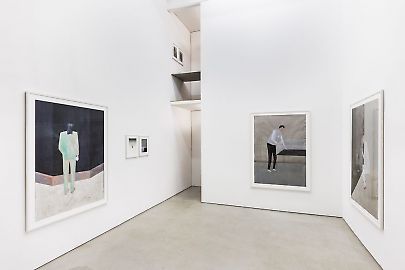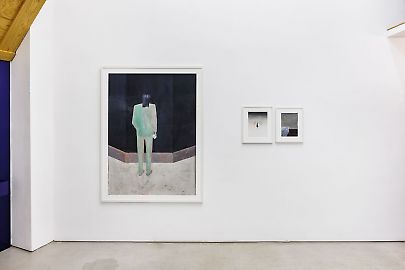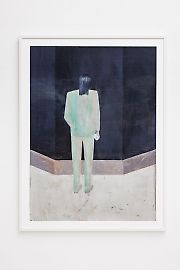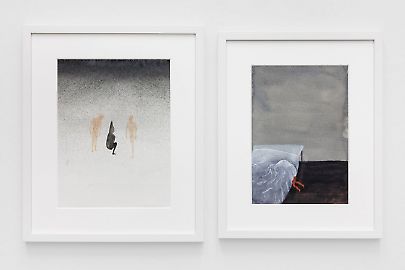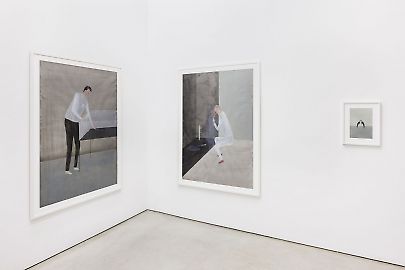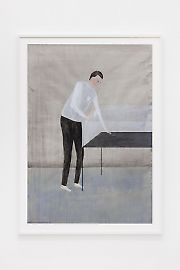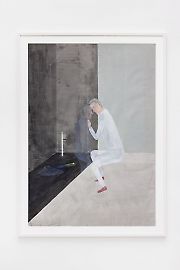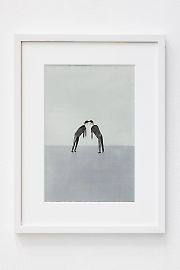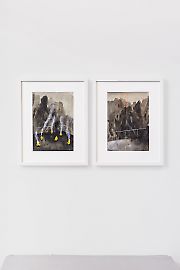Voloshyn Gallery hosted by Georg Kargl Fine Arts -- Maria Sulymenko, Is it time, yet?
Opening: September 1, 19.00 - 21.00
Georg Kargl Fine Arts is pleased to host Voloshyn Gallery from Ukraine, currently operating without a space in Kyiv, at Georg Kargl BOX. On view is the first solo exhibition of Maria Sulymenko (1981* Kyiv, Ukraine) in Austria.
There is something within Sulymenko’s watercolour paintings, that holds an audience spellbound. In the style of laconic simplicity, she depicts mysterious and puzzling environments. These are primarily interior but also exterior spaces, narrow and closed, surrounded by walls that appear palpable. In this silenced atmosphere of transparent grey air, the eye does not reach the horizon – there seems to be none.
The sceneries are barely inhabited. When nameless figures appear, they are mainly alone, sometimes two or three of them. Not characters, only beings. They do not look directly to the viewer, they gaze away. And despite the search for a connection, they do not actually belong; crossroads of human relations are rare here. It is as if time has stopped. Captured in a moment, which seems to be prolonged. The moment transforming into a state; not becoming, but rather – and just – being. Caught between the “no longer” and “not yet”, they are waiting for something to emerge, happen, maybe change.
“Etwas fehlt, was das ist, weiß man nicht,” writes Brecht in Mahagonny.[1] For Maria Sulymenko, it is not so much about a particular loss or disappearance, distinctive pain or grief, but about the fragility of life and the inevitability of darkness. She depicts loneliness but also intentionally chosen solitude; angst, and traumatic fears, as well as contemporary distresses and anxieties that lead to absurd situations and the imaginary. She quietly, almost naively, questions the difficulties of just being (and not necessarily becoming), of simply enduring in this world. There is no naïve optimism, but there exist bits of hope, she claims, an anticipation of a better time. “Each moment is a leap forwards from the brink of an invisible cliff, where time’s keen edges are constantly renewed. We lift our foot from the solid ground of all our life lived thus far and take that perilous step out into the empty air. Not because we can claim any particular courage, but because there is no other way.”[2]
Maria Sulymenko (1981, Kyiv, Ukraine) was born in a family of artists. After graduating from the Academy of Fine Arts in Stuttgart (Akademie der Bildenden Künste in Stuttgart), she continued her studies at the Hessen State University of Art and Design in Offenbach am Main (Hochschule für Gestaltung). Her recent group exhibitions include Shifting, Glances (Simone Subal Gallery, NYC, US, 2022), She Asked, I Followed. Her Name Is After (Fredric Snitzer Gallery & Voloshyn Gallery, Miami, FL, US, 2022), The Memory on Her Face: Part I and II (Voloshyn Gallery, Miami, FL, US, 2022) and the solo exhibition The Glass World of People and Things... (Voloshyn Gallery, Kyiv, Ukraine, 2017).
[1] »Something is missing, but what this is, one does not know.« Rise and Fall of the City of Mahagonny (German: Aufstieg und Fall der Stadt Mahagonny) is a political-satirical opera, happening in Mahagonny, a fictional city in then North America, inhabited by fortune seekers, prostitutes, and shady businessmen (and women) where absolutely anything goes—except having no money. Composed by Kurt Weill to a German libretto by Bertolt Brecht, it was first performed in 1930 in Leipzig.
[2] The Booker Prize-winner Han Kang's novel is a lyrical and disquieting exploration of personal grief, written through the prism of the color white. Portobello Books, London, 2017, translated from the Korean by Deborah Smith.


